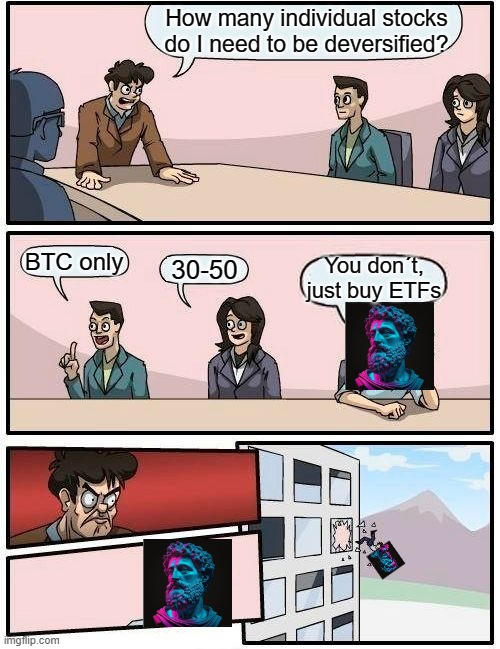At what point is my portfolio diversified? - Are 30 shares enough?
The question was asked recently:
"How many stocks do you think a diversified portfolio should have? I look forward to your opinion on this"
And as is customary on the Internet, a lot of opinions and half-knowledge were bandied about.
The answers vary between:
"only $BTC (-1,54%) " and "30-50"
If you look in other forums, numbers around 30 appear again and again.
But how do you arrive at this figure?
The 30 is derived from the central limit theorem.
https://en.wikipedia.org/wiki/Central_limit_theorem
However, this does not apply to us as investors. This is because it only applies under the assumption that the sample is randomly selected.
This then only applies to the respective sub-segment of the stock market. So you would have to buy 30 random US large caps and then repeat this for:
- US MidCaps
- US SmallCaps
- International LargeCaps
- International MidCaps
- International SmallCaps
- Emerging Markets
So if we want to have a diversified portfolio of randomly selected stocks with the ACWI IMI as a benchmark, we need more than 200 stocks. $SPYI (+0,25%) as a benchmark, then we need more than 200 stocks.
With the MSCI World $IWDA (+0,35%) it would be about 120 stocks,
This has little or nothing to do with reality, as investors do not pick their stocks at random. Selection bias is introduced into the system through the investor's likes and dislikes. To compensate for this, we therefore need far more values than in the previous example.
There is a nice article about this on Investopedia:
https://www.investopedia.com/articles/stocks/11/illusion-of-diversification.asp
Your Manager Risk Can't Be Diversified Away with Stock Picking.
One of the main reasons for this is that since 1926 only 4% of all stocks in the S&P500 have been responsible for 100% of the winners. Manager risk is therefore defined by not being able to identify these winners early enough, or not being given enough weight.
https://papers.ssrn.com/sol3/papers.cfm?abstract_id=2900447
The answer to the question:
"How many stocks do you think a diversified portfolio should have?"
Is... *drum roll - ddddddrrrrrrrrrrrrrrrrrrrrrrrrrrrrrrrrrrrrrr.........*
Not at all!
And if at all, then only with a huge portfolio of around 1000 stocks that is so close to the market that you might as well leave it alone. Which is logical, otherwise actively managed funds wouldn't perform so badly.
*disappointed groan*
Since >95% of all fund managers (and investors) underperform their benchmark over 20 years, it may be a good idea not to take this risk.
But what if I want to take active manager risk and do stock picking?
My tip:
90% in a broad world ETF
And the remaining 10% in a STRONGLY concentrated portfolio of 10 stocks or less.
Only high-conviction stocks.
The logic behind this is very simple, if your top 10 don't outperform the market, your top 20 won't either.
Note:
If you disagree, feel free to say so. However, the word "diversification" can mean different things to different people.
I have assumed here that you want to remove (diversify) the non-systematic risks.
For example, Political and Legal Risk, Entrepreneurial Risks, Manager Risk, Model Risk...
If the word has a different meaning for you, you will come to different conclusions.












